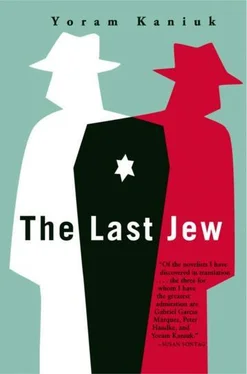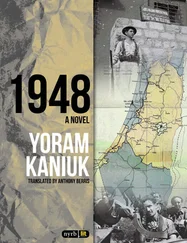Hasha Masha drinks her tea. In the glass, her teeth look quite white and big. Gray hair falls on her taut forehead, caught in the light of the sixtywatt bulb, she says from her glass, maybe hisses: Clowns of bereavement, Henkin. Members of an operetta deceiving your pain, your children will never be any more than what they were in their lives, Henkin, and I tell her with repressed rage, Ours, ours, Hasha Masha, ours! She says I had one son, Henkin, and he won't be anybody else, not because of the Committee, not because of Boaz Schneerson. My death is preserved in dark rooms, Henkin. And then I recall the episode of Boaz Schneerson and am silent because what will I say? But the German issue had another touch. The writer was very famous, they were waiting for him here, and maybe it really is so important for us to know what those who were our executioners are thinking? Maybe we like to be photographed on the rope? Pictures of hell on the walls of Paradise… And Hasha Masha gets up and makes herself some vegetable soup on that kind of kerosene stove that hasn't been used for some time, nothing had changed in her house, she has some definite nonobligation to the present, no faith in the future. I said to her: In biblical Hebrew there is no present tense at all, and she said: Obadiah Henkin, life is not Hebrew grammar. Life is Hebrew death, and I said angrily: But others die, too, all over the world people die in wars that are lost and not lost, and "others" is already grammar, because there is "other" and there are "other males" and "other females" and there is "they" and there is "we" and there is "you," I thought about that writer, about his words and what will I say to him and I talk about him with Hasha Masha, who turns her back to me and cooks vegetable soup for herself that smells wonderful but I don't eat despite my hunger, there's surely a meal waiting for me at the Shimonis and they're offended when I don't eat and I say: Maybe I won't go after all, what would Menahem say, there's also a matter of conscience and pride, maybe that's blasphemy, blasphemy of him, not us. She turned her face aside and looked at me for a long moment and next to her I saw a spot of oil that I notice at times on the wall, ever since that day many years ago when I threw the bottle of oil in anger at something she said, and she bent down and straightened up and laughed a mute repressed laugh, like weeping, and didn't answer, didn't fight, accepted my rage as well as my love with bitter and chilly sympathetic anger… How do you know what Menahem would say, she asked, on what authority do you struggle in his name? If he were a grownup today, maybe he would have gone there, maybe he would have imported gas stoves from there? Or color TVs? I shouted at her: No! No! No! And she said: Samuel Yankelevitch, who was your best student, to whom you regally granted very good grades when Menahem would come home with satisfactories and you said that's what you deserve, Menahem, didn't that brilliant Samuel Yankelevitch go there to buy gas masks he brought to Israel during the war, how do you know, did Menahem leave you a will?
Don't ask Menahem with that black magic, ask yourself, Henkin.
Outside was the fresh smell of approaching autumn. It was early evening. A time when the sourness of the air is clearly felt near the sea. When I was young I attended a German gymnasium, but when I came to the Land of Israel, I swore to read and write only Hebrew; my knowledge of English was superficial and almost inarticulate, I remember in 'thirtynine, the ship Patria came to the shore of Tel Aviv, not far from our house, got stuck on a sandbank, and all of us went out to the beach to mingle with the immigrants and carry them to the beach and confuse the English. I brought to our house a pale young man wearing a rotten belt, his teeth yellow in his mouth and dressed in capes and I remember sitting in the evening and the young man spoke German because he didn't know any other language, and he told things the mind refused to believe, I understood every word but something in me revolted, I couldn't talk with him, only mutter something, in those days I used to sit with the big map that Becker, the geography teacher, drew for me, my son helping me with pins and colored flags and I marking the fronts and the battles from the reports of the BBC and the Voice of Jerusalem. Menahem would laugh at his father even though he'd bring him the pins and flags and say: Henkin, beat the Germans on his map, the Jews are good for wars on maps. I was fascinated then by what the cafe experts called "the theater of war," and didn't pay heed to the contempt of one who would later be a real Jewish soldier, at least the double Menahem, the one who was and the one invented for me by Boaz, and now I can't tell them apart anymore, and I conquered Benghazi and retreated again to shape the border or to make a tactical retreat, years passed and I sat at the map, we conquered cities and we retreated, there were successful landings and less successful ones I accompanied the Red Army in its panicky retreat and then in its mighty victory procession. I was a strategic expert and at the Milo Club, where I'd stop to drink coffee with people who are mostly not among the living anymore, I was considered an expert in the information, but my heart was heavy, my family I had left there was destroyed, I went to the Jewish Agency with people and we knocked on windows, have to do more, we said, and they told us, we're doing, but that didn't satisfy us, and ever since then I've had a vague sense of disgust and offense that I wasn't there with them and this evening I have to represent a committee of dead youths to the hangman, no matter how many there are. I walk on Ben-Yehuda Street and turn toward Keren Kayemet Boulevard, lights sparkle, cars stop at traffic signals, cafes are buzzing as always, why, I wonder, did he ask to meet me of all people? As I was leaving the house, just a minute before I left the house, a window was opened in my neighbor's house, and I saw a woman's face looking toward our gate, maybe a painted face, as if her hair was blue and she was white, upright, glassy, and thus, pondering the sight of the woman who closed the window right after she saw my eyes staring at her, I came to the Shimonis' apartment and Jordana, our Yemenite, opened the door to me and looked wonderfully sweet and beautiful in the white dress she wore, maybe too sheer, but not offensive. Her dark, almost purple face stood out clearly on the white background of the dress and her hair was wrapped in two thin plaits that softly clasped her smooth head, her smile was open, her teeth were white, behind me the light suddenly went out and I was steeped in dark, and in front of me in the abundant light from the corridor stands the girl of our sons' dreams, gleaming in the flash of light, and I'm facing her, Henkin at the usual time, in person, my wife at home, alone, eating vegetable soup, the lost energy woven like a lordly and modest halo around the splendid hair of Jordana from the Ministry of Defense, a halo of the disaster we were all in, the enemy who comes to review the honor guard of dead youths.
In the doorway of the apartment of the Committee of the Dead stands Obadiah Henkin. A charred smell of his son rises in me. A German saving matches tosses my son straight into the fire, how much is two-fifths of an American cent in Israeli money? Sturmbahnfuhrer of literature counts matches and I come to meet him, how do the bereaved parents of Jewish children look in his eyes? My neighbor sends regards with a poem. Marar, from Marar, he sends regards, south, there Arabs were expelled sir, surely you weep for their fate, I can imagine that, and justly, and unjustly, a Yemenite woman beams at me in the doorway of the sanctuary of the Shimonis who have never lacked money, filing pains, come in, shaking hands, smiling, everything's professional, organized, very formal, one of the veteran Hebrew teachers, and I thought about Jordana's devotion to us, about her beauty wasted on us. Of all the sons, she told me, I love Menahem the best. At first I was amazed at the phrase, then I got used to it, as if it were obvious that of all the sons she'd choose Menahem, I would almost have married them off to one another, in moments of nightmare, at night, maybe against Noga, between one dozing and another. And when she came to our house and Hasha Masha looked at her suspiciously but also graciously, with a certain compassion, but without contempt, she didn't give in, wanted to see the photos again, to hear the poem Menahem wrote, spoke angrily of Noga who was unfaithful to Menahem and went to live with Boaz, back then she surely didn't know Boaz. I wanted to say to her: Look, Menahem died many years ago, you were then four, five, six years old, but she'd fix me with a wild look, ardent and virginal at the same time, what's the difference? As if love or life really could be divided into periods, everything is one piece, and if I've got our Menahem, why shouldn't she? Maybe Jordana was his great love? And she smiles a professional, almost cold smile at me, surely I know her dark side, when she sits in my house and loves my son with a desperate love. Here in the Shimonis' house, she's on duty, frozen, modest, smiling, embracing her dear parents, who knows how many of them were previously her lovers, and she dropped them for Menahem, her great love, what do I know? I know that there were two men in her life, something happened to both of them, they said of her that she kills men. They're afraid of her. She brings bad luck, they said, and ever since then enclosed in the department of commemoration, letters, poems, memorial books, statues, always willing to help, to run to the printers, to study, to find material, to find contributions or grants, and surely Menahem her great love was a fake Menahem, not the one that was but the one I made up out of Boaz's lies. But she loves him and I won't rob her of him, what do I understand about love? When my only love is Hasha Masha sitting now and loathing me in her heart and yet loving me in her own way, as if her malice is a dim yearning of flesh…
Читать дальше












